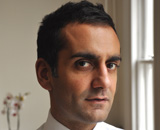 There are more and more mobile phone apps for wellness and health, so many in fact that it’s already impossible to stay abreast of them. However, I recently came across one for the iPhone that I think all doctors simply must have.
There are more and more mobile phone apps for wellness and health, so many in fact that it’s already impossible to stay abreast of them. However, I recently came across one for the iPhone that I think all doctors simply must have.
It’s called GP Ratings and it presents data from the 2010/11 GP patient survey conducted by an independent agency on behalf of the Department of Health of England.
There are two things I love about this app—its simplicity and its objectivity.
My love of its simplicity is based on the fact that it answers a plain question: “Which is the best practice in my area?” All too often in healthcare we get caught up in the nuances of data but much of this is of little concern to patients who want a simple answer to a simple question. This app gives it to them.
I’m sure that some readers will think it’s too simple. It uses the answers from the patient survey, which one reviewer in the App Store says: “is widely acknowledged by the profession as unreliable.” Another reviewer points out that it “only picks up [patient’s] views.” My answer to these people is we should improve the method, not slam a product for answering an important question that patients ask.
I think all doctors should have this app because one of the most common questions non-medical friends ask us is whether we can recommend a good doctor or comment on whether a doctor is any good. I always feel self conscious when trying to answer, partly because, rightly or wrongly, medical culture teaches us not to openly criticise our colleagues, and also because all I can really say is I know someone, it doesn’t mean I have objective evidence that they’re any good. I can now use this app to help people find local practices suited to their needs without passing judgment on my colleagues.
One of the key criticisms of the app is that once you’ve used it to assess local practices you don’t need it again. That’s probably true for most patients but not for more mobile people, such as students, or people taking care of friends and relatives in other parts of the country where they may not know the local practices. Indeed, I can imagine a few people using this app to inform the choices of four or five of their friends and relatives could have a significant impact on practice registrations.
I recently met the creator of the app and was surprised to learn that he works at the NHS Information Centre. I found it curious that he was able to create something so simple (and hence powerful) from the mass of data collected, while the Information Centre struggles to even make its website navigable. It seemed his ability to focus on a key question and find a way to present a simple answer was not being used in his day job—a loss to all taxpayers.
However, he also showed me the alpha of the next version of the app. He’s pulled together even more data into the ratings, which I am sure the methodologists will love. I’m worried, though, that while it may become more acceptable to the medical community, it will lose its stark simplicity—the key to its power. We shall see.
In the meantime, I really think all doctors should have this app; it’s a glimpse into an inevitable future.
Competing interests: Although I have met the creator, I will in no way benefit from more people downloading the app. I paid 69p for the app—its price at the time—and am unaware of whether it remains at that price or is now free, something the creator was thinking of doing.
Pritpal S Tamber is the director of Optimising Clinical Knowledge Ltd, a consultancy that helps organisations improve how they use established clinical knowledge. He was previously the medical director of Map of Medicine Ltd, a company that creates clinical pathways to help health communities design services. He was the editorial director for medicine for BioMed Central Ltd and he was also the managing director of Medicine Reports Ltd. He has twice been an editor at the BMJ, the first time as the student editor of the Student BMJ.
